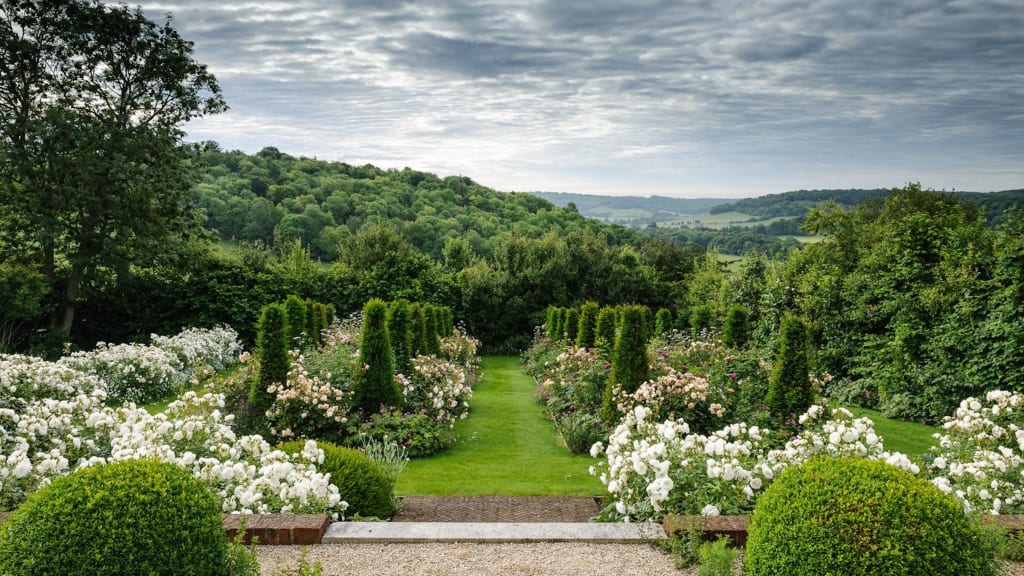The Enchanting World of Gardens
A Tapestry of Nature's Beauty

Gardens, those captivating wonders of nature, have held a timeless allure for humanity throughout the ages. From ancient civilizations to modern urban landscapes, these green sanctuaries have been cherished for their ability to offer respite, rejuvenation, and a profound connection with the natural world. Whether sprawling public parks, intimate backyard retreats, or meticulously designed botanical gardens, each one weaves a unique tapestry of beauty and wonder, leaving visitors entranced by their spell.
A Historical Legacy:
The history of gardens traces back to the dawn of civilization. The Hanging Gardens of Babylon, one of the Seven Wonders of the Ancient World, stood as a testament to the love and devotion of King Nebuchadnezzar II for his queen, Amytis. The ancient Egyptians designed sacred gardens around temples and palaces, cultivating symbolic plants like lotus and papyrus. In East Asia, traditional Chinese and Japanese gardens embraced the philosophy of harmony with nature, reflecting the spiritual and aesthetic ideals of the culture.
Throughout history, gardens have served multiple purposes beyond mere aesthetics. They were symbols of power, wealth, and cultural expression, embodying the values and aspirations of societies. As civilizations flourished, so did their gardens, evolving into artistic masterpieces that bridged the gap between human creativity and nature's splendor.
A Symphony of Flora:
At the heart of every garden lies its lush tapestry of flora, meticulously curated to create a harmonious display of colors, scents, and textures. The selection of plant species can vary widely, from vibrant beds of blooming flowers to serene groves of towering trees. Each garden design is a canvas for horticultural artistry, and expert gardeners carefully craft these living works of art.
Formal gardens often feature neatly arranged geometric patterns, with trimmed hedges and precisely planted flowers, evoking a sense of order and symmetry. In contrast, informal gardens embrace a more naturalistic approach, where plants are allowed to grow freely, creating an organic and ever-changing landscape.
The choice of flora also reflects the unique climate and geographical features of the garden's location. From the arid cacti gardens of the American Southwest to the lush tropical gardens of Southeast Asia, each region brings its distinct botanical charm to the world of gardens.
Ephemeral Beauty:
One of the most enchanting aspects of gardens lies in their transient nature. With each passing season, the scenery transforms, and new blooms emerge, creating an ever-changing spectacle. Spring breathes life into dormant landscapes with a burst of colorful blossoms, while the vibrant hues of autumn signal a time of reflection and transition. Winter blankets the world in a serene hush, offering a stark yet captivating beauty.
This ephemeral quality of gardens reminds us of the impermanence of life and urges us to cherish the fleeting moments of beauty that surround us. Each visit to a garden is a unique experience, as no two days in a garden are ever the same, making each encounter a precious memory to cherish.
A Feast for the Senses:
A visit to a garden is not merely a visual delight; it is a sensory journey that engages all the senses. The gentle rustling of leaves in the breeze, the fragrance of blooming flowers carried on the wind, the soothing touch of soft grass underfoot – all combine to create an immersive experience that transcends the ordinary.
Birds and butterflies flit from flower to flower, adding their melodies and vibrant colors to the symphony of nature. The murmur of flowing water in fountains and streams creates a calming soundtrack, inviting visitors to pause, reflect, and find solace in the moment.
Gardens as Cultural Expressions:
Gardens are not only expressions of natural beauty but also reflections of culture and history. In many cultures, gardens hold spiritual significance, representing the connection between humanity and the divine. Japanese Zen gardens, with their carefully raked gravel and carefully placed stones, are designed to inspire contemplation and meditation. Islamic gardens often feature elaborate water features, symbolizing life-giving abundance and paradise.
In some cases, gardens are designed to commemorate historical events or honor notable figures. Monet's Garden in Giverny, France, immortalizes the renowned artist's love for beauty and creativity. The Garden of Cosmic Speculation in Scotland takes inspiration from scientific principles, turning abstract concepts into breathtaking landscapes.
Gardens in Urban Landscapes:
As urbanization continues to shape the world, the value of green spaces within cities becomes ever more apparent. Urban gardens provide havens of tranquility amidst the hustle and bustle, acting as natural oases that rejuvenate both the body and the mind.
Community gardens foster a sense of belonging and collaboration, bringing together individuals from diverse backgrounds in a shared endeavor of nurturing nature. Rooftop gardens and vertical greenery in skyscrapers are innovative solutions that integrate greenery into the urban fabric, promoting sustainability and reducing the urban heat island effect.
A Pathway to Well-Being:
Scientific research has affirmed what poets and garden enthusiasts have long known - spending time in gardens is beneficial for our well-being. Immersion in nature has been linked to reduced stress levels, improved mood, and increased cognitive function. The act of gardening itself can be a therapeutic and grounding experience, allowing individuals to connect with the earth and witness the tangible fruits of their labor.
Preserving Nature's Legacy:
As urbanization and environmental challenges persist, the preservation and creation of gardens take on new significance. Botanical gardens and arboretums play a crucial role in safeguarding endangered plant species and preserving genetic diversity. Educational programs in these gardens raise awareness about the importance of conservation and sustainable practices.
Public gardens, too, are vital in fostering environmental stewardship and cultivating a sense of wonder and appreciation for the natural world in future generations.
In conclusion, Gardens are not mere spaces; they are living reflections of humanity's relationship with nature and the world around us. From their historical roots to their enduring relevance in modern society, gardens continue to captivate hearts and souls, providing spaces for reflection, inspiration, and connection. These enchanting sanctuaries, born from the artistic imagination and nurtured by human hands, invite us to step away from the clamor of daily life and enter a realm of tranquility, where the wonders of nature weave a timeless tapestry of beauty.






Comments
There are no comments for this story
Be the first to respond and start the conversation.